
UK Prime Minister Boris Johnson narrowly survived a no-confidence vote on Monday that was triggered by lawmakers in his party amid a slew of controversies, maintaining his position.
The official needed a simple majority of the 359 Conservative members of Parliament to vote in his favor to remain prime minister. Surprisingly, Johnson won the vote, with 211 supporting him and 148 voting against him.
Boris Johnson's Narrow Win
A vote of no confidence in the Conservative Party is triggered if the party's leader receives letters of request from at least 15% of sitting Conservative members of Parliament. On Monday morning, Conservative Party official Graham Brady said the threshold had been passed.
Johnson was not directly elected to serve in his role as prime minister of the United Kingdom but was appointed by the political party that wins the majority seats in Parliament. In the event that he lost the vote on Monday, the Conservative Party, which holds the majority, would have chosen a new leader to automatically take over the role, as per CBS News.
Earlier this month, the prime minister was fined by the police for breaking the law after an investigation found that he and his colleagues had held and attended parties during the height of Britain's coronavirus lockdown in 2020.
The incident, which is known as the "partygate" scandal, was the revelation that government officials were having wine and cheese in Johnson's official residence at Number 10 Downing Street. The controversy was filled with photographs of the event and came as members of the public were prevented from visiting dying relatives under COVID-19 restrictions.
According to CNBC, the no-confidence vote came at a time of deep dissatisfaction with Johnson's leadership and behavior while in office less than three years after he secured a parliamentary majority.
Conservative Party
With Johnson's narrow margin in winning the vote, there is now a real possibility that he could face another confidence vote in the near future to try to replace him as prime minister. Often, if a British leader wins a confidence vote, they are protected from another vote for the following 12 months.
However, there have been reports that these rules could soon change, and the close nature of Monday's result would make this event more likely. Brady, who is the chairman of the 1922 Committee that oversees leadership challengers within the Conservative Party, said it was "technically" possible for the rules to change.
There is also the possibility of Johnson resigning of his accord, but despite previous rumblings of discontent among Tory MPs over the prime minister's colorful and often controversial leadership, he had shown no signs of intending to step down from his position.
In an interview, Johnson called his narrow no-confidence vote win a "decisive result" despite the fact that 40% of members of his party voted against him. The prime minister said, "I think it's an extremely good, positive, conclusive, decisive result which enables us to move on, to unite and to focus on delivery (of services)," Fox News reported.
Related Article: Prince Louis Steals the Platinum Jubilee Spotlight Again After Shushing, Covering Kate Middleton's Mouth
© 2025 HNGN, All rights reserved. Do not reproduce without permission.








